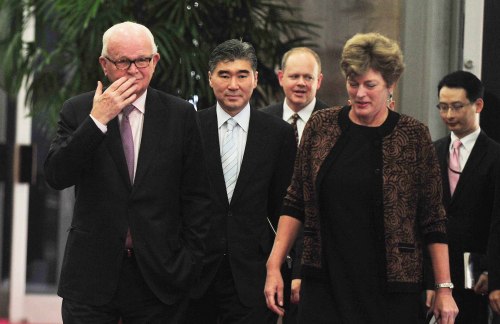A senior U.S. envoy visiting Seoul expressed hopes of restarting the stalled multinational negotiations on North Korea’s denuclearization, but emphasized the process would take a “lot of work” and time.
Washington’s special envoy on North Korea Stephen Bosworth arrived in Seoul on Sunday as the first stop in his trip around partners of the six-nation denuclearization talks involving the two Koreas, the U.S., China, Japan and Russia.
The visit by the top U.S. official is seen as another responsive move to the recent coordinated efforts by Beijing and Pyongyang to reopen the talks that have been suspended for nearly two years.
Although Seoul and Washington have been claiming talks can only resume after the North admits to sinking a South Korean warship in March and shows an earnest attitude toward abandoning its nuclear programs, the trip by Bosworth is seen as part of Washington’s efforts to lay the groundwork for resuming the negotiations.
Washington’s special envoy on North Korea Stephen Bosworth arrived in Seoul on Sunday as the first stop in his trip around partners of the six-nation denuclearization talks involving the two Koreas, the U.S., China, Japan and Russia.
The visit by the top U.S. official is seen as another responsive move to the recent coordinated efforts by Beijing and Pyongyang to reopen the talks that have been suspended for nearly two years.
Although Seoul and Washington have been claiming talks can only resume after the North admits to sinking a South Korean warship in March and shows an earnest attitude toward abandoning its nuclear programs, the trip by Bosworth is seen as part of Washington’s efforts to lay the groundwork for resuming the negotiations.

“We, I think, look forward the process of bilateral contacts and eventually multilateral contacts that would hopefully result in the resumption of the six-party process,” Bosworth told reporters after meeting with officials in Seoul on Monday.
“But there’s a lot of work to do before that happens,” he said. “We‘re not setting any timetables.”
The senior U.S. official met consecutively with Seoul’s Unification Minister Hyun In-taek, acting Foreign Minister Shin Kak-soo and chief nuclear envoy Wi Sung-lac to discuss the prospect of resuming the six-nation talks.
With its longstanding ally China as the negotiator, North Korea has been expressing a renewed willingness to return to the aid-for-denuclearization talks it walked from at the end of 2008.
Slapped with new U.S. sanctions for torpedoing Seoul’s warship Cheonan in March and facing deepening food shortages due to recent floods, the reclusive state has also been upping reconciliatory gestures toward Seoul and Washington by freeing detained civilians from the two states.
Calling the discussions with the Seoul officials “very useful,” Bosworth again emphasized the two longstanding allies would “not abandon sanctions” that have been slapped on North Korea by the U.N. and the international community.
“I don’t have either optimism or pessimism (about resumption of the six-party talks),” he said. “We try to assess the situation as we see it.”
The U.S. is “not interested in talking just for the sake of talking,“ added Bosworth. “We look for North Korea’s attitude to be expressed through its actions, not simply through its rhetoric.”
Bosworth’s visit comes only nine days after South Korea’s Wi visited Washington to discuss with him the issue of restarting the six-party talks. The U.S. envoy is scheduled to visit Japan and China after his Seoul trip for similar consultations.
“We are not going to Moscow on this visit but I do anticipate consulting with our Russian colleagues in the very near future,” Bosworth said.
Meanwhile, South Korea’s Red Cross announced earlier Monday it will send thousands of tons of rice and cement to the flood-stricken North, a move that is viewed as a positive development in the process of reopening the denuclearization negotiations.
The two Koreas are also working on opening a new round of reunions of families separated by the 1950-53 Korean War, which ended in a truce rather than a permanent peace treaty.
By Shin Hae-in (hayney@heraldcorp.com)



![[Exclusive] Korean military set to ban iPhones over 'security' concerns](http://res.heraldm.com/phpwas/restmb_idxmake.php?idx=644&simg=/content/image/2024/04/23/20240423050599_0.jpg&u=20240423183955)




![[Herald Interview] 'Amid aging population, Korea to invite more young professionals from overseas'](http://res.heraldm.com/phpwas/restmb_idxmake.php?idx=644&simg=/content/image/2024/04/24/20240424050844_0.jpg&u=20240424200058)

![[Pressure points] Leggings in public: Fashion statement or social faux pas?](http://res.heraldm.com/phpwas/restmb_idxmake.php?idx=644&simg=/content/image/2024/04/23/20240423050669_0.jpg&u=)








